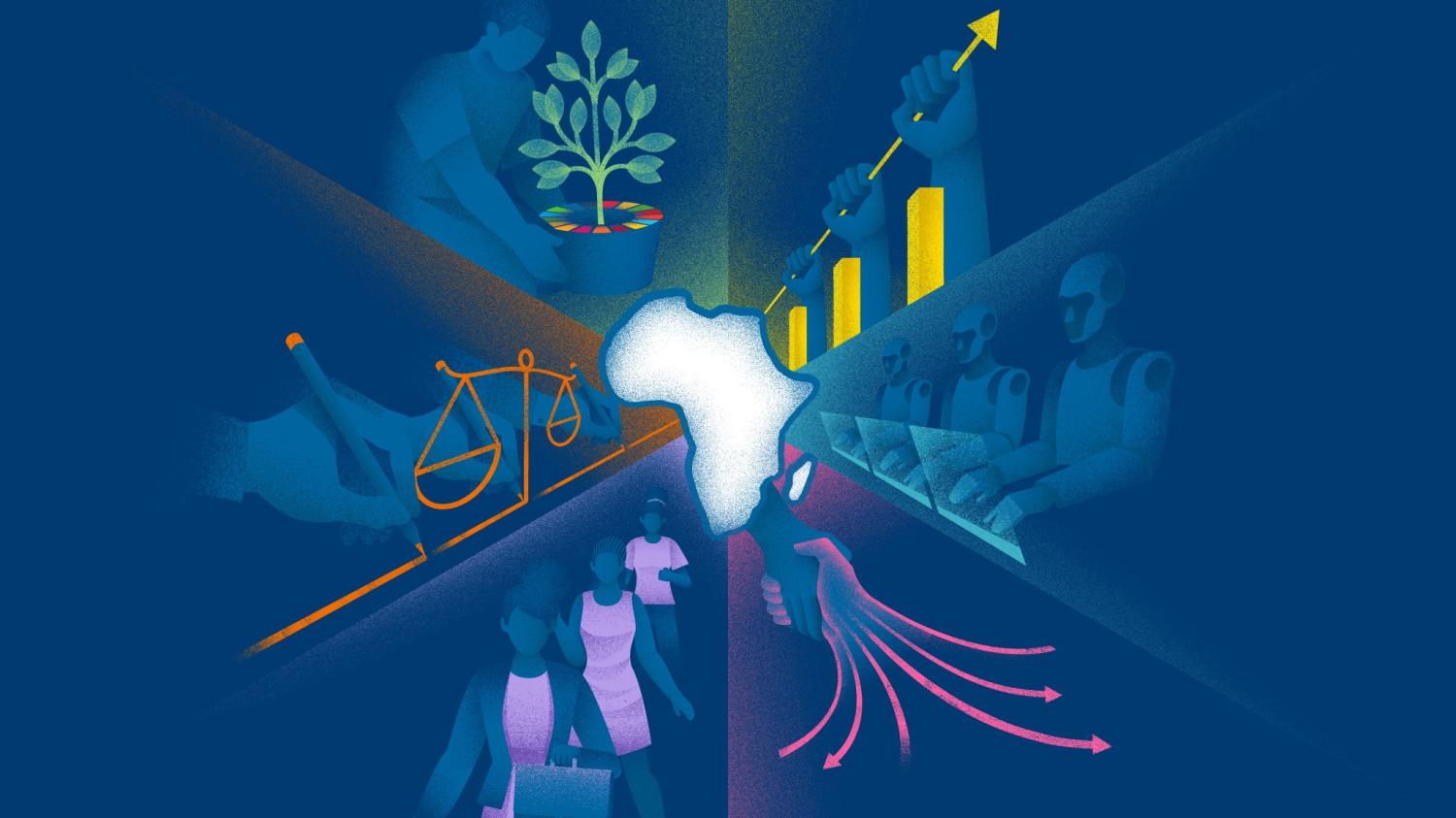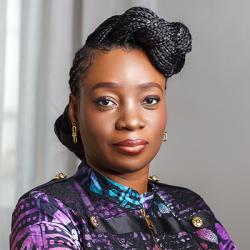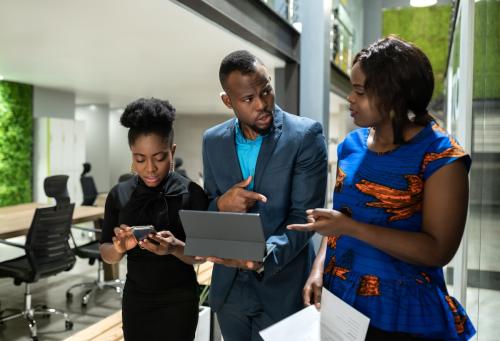This viewpoint is part of Chapter 3 of Foresight Africa 2025-2030, a report with cutting-edge insights and actionable strategies for Africa’s inclusive and sustainable development in the run-up to 2030. Read the full chapter on women and youth.
Addressing these challenges demands a fresh, systemic lens, one that reimagines education not just as schooling but as a holistic and ongoing process.
Africa is a young continent, with 40% of its population aged 15 or younger as of 2021.1 This “youth bulge” represents both an opportunity and a risk,23 with education able to tip the scale in favor of opportunity. For Africa to foster innovation, employment, and social mobility in its teeming population, it is imperative to focus on inclusive, equitable, relevant, and quality education for all. Sustainable Development Goal (SDG) 4, focused on quality education, is considered to be an enabler of the other SDGs.4 Facing the five-year runway to 2030 and the expiration of SDGs, it is critical to accelerate the pace at which education systems foster and support relevant learning and skills development.
However, systemic barriers to funding, quality teaching, infrastructure, and access, interlaced with sociocultural and governance issues, create a complex challenge for achieving SDG 4. Disconnects between policy and practice are evident,5 and gender-based discrimination and violence, poverty, rurality, conflict, and disability continue to preclude millions of marginalized children from accessing and completing education. In Malawi, for instance, for the age group between 15 and 17, 85% were deprived of education, making it the metric with the highest level of deprivation.6
Sub-Saharan Africa has a teacher shortage of 15 million, greatly undermining access to quality education.7 Curricular gaps, including a mismatch with labor market demands and a lack of emphasis on relevant skills, severely compromise the quality and relevance of education in Africa.8 For instance, although the Malawian economy relies on agriculture and positioning the country’s agricultural sector as an engine of growth is a major development goal for the country, research reveals glaring gaps in related skills, such as those required for export-oriented agriculture—skills that the education sector should ideally nurture.9
Addressing these challenges demands a fresh, systemic lens, one that reimagines education not just as schooling but as a holistic and ongoing process for the development of a range of skills, adaptability, and equity, in alignment with the realities of today’s world and the demands of tomorrow. This transformational paradigm would center the vision and purpose of education for societies, innovate to improve how learning happens, and align incentives, relationships, and mindsets across the system to achieve a shared vision for education.10
Strategic partnerships and collaborative networks are required to nurture this paradigm shift. Networks of civil society organizations (CSOs), for example, possess the power and agency to illuminate critical educational issues through an exchange of contextually relevant and nuanced perspectives, ensuring that marginalized voices in their ecosystems are centered in the pursuit of quality and inclusive education. The Network for Education Systems Transformation, for example, is a global network of CSOs that views transformation as a comprehensive and systemic process that rethinks how education is delivered, accessed, and valued within a society.11 Equipping all children with a breadth of skills is the essential pathway to overcoming challenges such as those faced by Africa, and it is through a collaborative mindset shift that our systems can begin to provide children with this breadth of skills.
CSOs have an important role to advocate with other ecosystem actors for the structural, relational, and transformative changes which are systemic conditions that will foster the sustainable development and prosperity of the African continent.12 With just five years to go until the expiration of SDG 4, the time to act is now.
-
Footnotes
- Saifaddin Galal, “Population of Africa in 2021, By Age Group,” Statista, June 30, 2024, https://www.statista.com/ statistics/1226211/population-of-africa-by-age-group/.
- Julius Abgor, Olumide Taiwo and Jessica Smith, “Sub-Saharan Africa’s Youth Bulge: A Demographic Dividend or Disaster,” in Foresight Africa: Top Priorities for the Continent in 2012, Brookings Institution, January 5, 2012, https:// www.brookings.edu/wp-content/uploads/2016/06/01_youth_bulge_agbor_taiwo_smith.pdf.
- “State of World Population 2014 | The Power of 1.8 Billion: Adolescents, Youth and the Transformation of the Future” (New York: UNFPA, 2014), https://www.unfpa.org/swop-2014.
- Patrick Walsh, “Education is the Enabler for Sustainable Development,” SGD Action, September 9, 2022, https://sdgaction.org/education-is-the-enabler-for-sustainable-development.
- Noam Angrist and Stefan Dercon, “Understanding Gaps Between Policy and Practice,” What Works Hub for Global Education (working paper), University of Oxford, July 22, 2024, https://www.bsg.ox.ac.uk/research/publications/whatworks-hub-global-education-understanding-gaps-between-policy-and.
- “Child Poverty in Malawi: 2018 Report” (Zomba: The Government of Malawi and UNICEF 2018), https://www.unicef. org/esa/sites/unicef.org.esa/files/2019-01/UNICEF-Malawi-2018-Child-Poverty-in-Malawi.pdf.
- “Global Report on Teachers: What You Need to Know,” UNESCO, accessed December 17, 2024, https://www.unesco. org/en/articles/global-report-teachers-what-you-need-know.
- A Call for the Transformation of Education for All in Africa Through Curricula | International Bureau of Education,” UNESCO, May 24, 2024, https://www.ibe.unesco.org//en/articles/call-transformation-education-all-africa-through-curricula.
- Komani Tembo, Tembo Mavuto and Mapopa Dominic, “The Consequences for the Absence of Practical Agriculture and TEVET in Primary and Secondary Schools in Malawi on Agribusiness and Employment,” International Journal of Vocational and Technical Education 15, no. 1 (2023): 1-11, https://academicjournals.org/journal/IJVTE/article-full-textpdf/2DB01E570743.
- David Sengeh and Rebecca Winthrop, “Transforming Education Systems: Why, What, and How,” Brookings Institution, June 2022, https://www.brookings.edu/wp-content/uploads/2022/06/Brooking_2-Pager_FINAL.pdf.
- “Knowing-Doing Network Leadership Coalition,” Brookings Institution, accessed December 17, 2024, https://www.brookings.edu/projects/knowing-doing-network-leadership-coalition/.
- John Kania, Mark Kramer and Peter Senge, “The Water of Systems Change” (Boston: FSG, June 2018), https://www.fsg.org/resource/water_of_systems_change/.
The Brookings Institution is committed to quality, independence, and impact.
We are supported by a diverse array of funders. In line with our values and policies, each Brookings publication represents the sole views of its author(s).







Commentary
Why Africa urgently requires transformation of its education systems
April 16, 2025